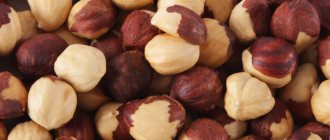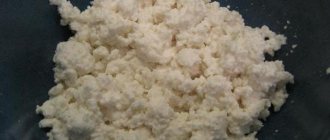Properties of apple
Nutritional value and composition | Vitamins | Minerals
How much does an apple cost (average price per 1 kg)?
Moscow and Moscow region.
65 rub.
It would seem that everyone knows everything about apples. But at the same time, this fruit, which is well known to each of us, remains one of the most mysterious, because numerous information about it gives rise to confusion and confusion, many rumors and myths. Therefore, it’s time to figure out what we actually know about apples and what can be considered true.
Central Asia, the territory of present-day Kazakhstan and Kyrgyzstan, is considered the birthplace of apples. In these areas, the apple tree is still found growing wild. From there, a grandiose and victorious march of the apple tree began around the world. Now it is difficult to imagine an area where apples would not grow or be eaten.
This is such a popular fruit that it is very difficult to talk about its culinary uses. An apple can be used in preparing almost any dish, from meat dishes to all kinds of desserts. And the apple will give each of them a unique taste and amazing aroma. The calorie content of an apple is 47 kcal. per 100 gr.
This is one of the most popular dietary products; apples are included in almost all diets. It is believed that green apples are the best for weight loss, but in fact, the beneficial properties of different varieties of apples (of which, by the way, there are an indescribable number) are approximately the same.
Chemical composition of fruits, vitamins
A description of the chemical and vitamin content of apples explains all the benefits of this fruit for the human body. Fresh fruits are a real storehouse of vitamins. Ripe fruit contains a large number of different macro- and microelements, and their percentage depends on the variety, growing and storage conditions. 100 g of green apple contains an average of 0.4 g of protein and fat, the main part being carbohydrates - about 10 g. Despite the fact that the product is low in calories, you should not abuse it, since it contains a lot of carbohydrates. At the same time, this is a great way to replenish energy reserves after heavy physical activity. Composition of apples:
- water – 70 g;
- dietary fiber, fiber – 1.8 g;
- sugar – 9 g;
- organic acid – 0.8 g;
- starch – 0.8 g;
- saturated and unsaturated fatty acids – 0.2 g.
Amazing properties of the usual onions
The nutritional value of apples for most varieties is no more than 50 kcal per 100 g, but for some types this figure reaches 90 kcal.
The low starch content ensures a low energy value of the product, and a large percentage of water helps it to be easily digested. The apple is also rich in various chemical compositions. Among microelements, these are, first of all, iron and iodine. Macroelements are represented by phosphorus, magnesium, calcium, potassium, sodium. Among the wide list of vitamins, beta-carotene, B3, riboflavin, thiamine, and folic acid deserve attention.
The glycemic index for a product plays an important role in dietetics. It shows how quickly the nutrients included in the dish are absorbed. The higher this indicator, the faster a person will want to eat again. For example, for glucose it is 100. For the process of burning fat, nutritionists urge you to pay attention to foods with a low glycemic index (indicator 0-49). For an apple it is 35, which once again proves its usefulness in the fight against excess weight.
Apple varieties
The most common varieties of apples, which are most often used in our country for culinary purposes, include:
- Ranetka apples
- Golden apples
- Apples white filling
- Apples Antonovka
- Apples Idared
- Jonagold apples
- Apples Gloucester
- Apples Melba
- Apples Mantet
- Apples Gala
- Apples Bogatyr
- Apples Lungwort
- Apples Chinese
- Granny Smith apples
- Apple Lobo
- Apples Florina
- Apples Glory to the winners
- Apples Grushovka
- Apples Jonathan
- Apples Anise
- Apples Mackintosh
- Apples Pepin
- Fuji apples
- Apples Spartan
Contraindications
There are also contraindications for consuming this tasty and healthy fruit, but there are not many of them:
- You should not eat fresh fruits if you have gastritis or exacerbation of gastric and duodenal ulcers, as they contain acids that destroy the lining of diseased organs.
- Intestinal diseases complicated by increased gas formation.
- Individual intolerance.
- If you have kidney stones and colitis, you can eat apples in the form of puree.
You need to listen to the advice of doctors so as not to harm your health. It is better to eat not sweet apples, but those with sourness. One sweet apple contains a lot of sugar and few nutrients.
Practical advice: If it is impossible to eat fresh sour apples, then prepare various dishes from them. There is no need to chase big glossy fruits; they lie in warehouses for a long time and lose all their vitamins.
It is important to follow the recommendations for consuming the fruit so as not to provoke the development of any pathologies, as well as not to aggravate previously diagnosed ones. In the presence of diseases, the specifics of eating apples are discussed with a doctor, since only he can evaluate the composition and correlate the possibilities of regularly introducing the product in question into the diet.
Benefits of apple
The composition of the apple is indescribably rich and varied. In particular, the apple contains vitamins B, C, E, PP, as well as potassium, iron, calcium, magnesium, and iodine. It is noteworthy that during storage the amount of nutrients in an apple decreases very slightly, so apples even from last year’s harvest are very useful. In addition to the components mentioned, apples contain fiber, starch, tannins and pectin.
All this makes the apple beneficial for all body systems. For example, the positive effect of apples on the cardiovascular system is expressed in their ability to strengthen the walls of blood vessels, increase their elasticity and permeability.
Apples have a mild laxative and diuretic effect. This explains the benefits of apples for the gastrointestinal tract and urinary system. The substances contained in apples have the ability to bind harmful and toxic substances and remove them from the body.
Apple is considered a natural antioxidant, so regular consumption of apples helps prevent many viral and infectious diseases. The general availability of apples makes them practically indispensable for the prevention of spring vitamin deficiencies.
Methods for preparing the fruit
There are several ways to cook apples:
- baked apples. The baked fruits can be consumed even if you have digestive problems or diseases of the pancreas and gall bladder. To bake apples, just cut out the core, put a teaspoon of sugar there, fill it halfway with cold water and put it on the stove over low heat. When the fruit becomes soft, it can be served;
- To enjoy apple compote and pies in winter, apples can be dried. To do this, you need to cut the fruits into thin slices, spread them in an even layer on a baking sheet and leave them in the sun. To make the process faster, you can dry the apples in the oven at a temperature of 100 degrees or purchase a special apparatus for drying fruits;
- soaked apples. This dish can be called a real delicacy: the tart taste of pickled apples will delight the whole family during the cold season. After all, such apples can be stored for more than a year. Preparing pickled apples is easy. Whole, strong, medium-sized fruits are selected. They should be soaked in water with the addition of various spices, sugar and even berries. The composition of the marinade depends on your taste preferences. You can experiment by adding cinnamon, cardamom, cloves and even red pepper. Pre-washed fruits are poured with the prepared mixture, placed under a load and infused in this way for several days.
Apples have a positive effect on the body: this fact is considered proven. However, you should not get carried away with apple diets: this can lead to dire consequences. Nutritionists believe that one or two fruits a day is enough to improve your health!
Apple harm
However, with all the benefits of an apple, you need to remember about the contraindications that its use has. First of all, the harm of an apple can occur if it is consumed excessively as the basis for a mono-diet. A large amount of fiber can cause disturbances in the gastrointestinal tract, especially if peptic ulcers, gastritis, and colitis are already present.
Negatively, apples can affect the condition of tooth enamel; if consumed excessively, apples cause its thinning. In addition, experts warn that apple seeds contain hydrocyanic acid, which is considered a toxic substance.
How to select and store apples
The quality and freshness of apples is determined by their type. If the fruits have a uniform color characteristic of the variety, their skin is shiny, clean, not wrinkled, without mechanical damage (cuts, chips), and has no traces of bacterial contamination (brown spots of rot or mold), then we can conclude that they are fresh and healthy.
The next selection criterion is elasticity and smell. An apple spoiled by internal rot or a worm loses its density and exudes a stale smell. To check the condition of the fetus, take it in your hand and squeeze it lightly with your index finger and thumb. If it doesn't flatten, then it's good.
The smell test is carried out in the usual way, turning the top of the apple towards the nose, because mold on the sides, if any, is wiped off before selling. If only apple aroma is felt, without any foreign odors, then the product is considered safe.
Winter varieties are prepared for future use:
1st method . Unwashed dry fruits are wrapped individually in a piece of paper or newspaper to protect the skin from damage, and placed in a box with holes for air ventilation.
2nd method . To keep the apple fresh and juicy, each fruit is wiped with a napkin soaked in glycerin and placed in layers in a box or banana box. Store in a cool, dark place.
Apples of summer varieties are stored in the refrigerator for up to 1.5 months, and in open containers at room temperature for up to 2 weeks. Autumn varieties have a longer shelf life: from 2 to 5 months. in the refrigerator and from 1 to 3 months. under normal conditions.
Dried apples are stored in a dry, cool place, protected from sunlight, in paper bags or cardboard boxes with a lid closed and sealed with tape.
In conclusion, we should cite a popularly known axiom: despite the many ways and recipes for using apples in canning, cooking, juice and wine production, their energy value, calorie content, nutritional and beneficial properties in an optimal ratio are manifested only in fresh form. And if you eat only 1 apple a day every day, then you can forget about doctors.
Author: Nadezhda Lyutova
Article design: Anna Vinnitskaya











